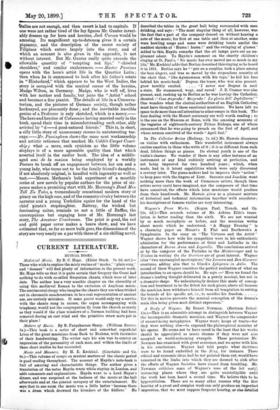Wagner's Prose Works. (Kogan Paul, Trench, and Co. I2s. 6d.)—This
seventh volume of Mr. Ashton Ellis's trans- lation is better reading than the sixth. We are not wearied by so much metaphysic as before, and the musician writes about music which he understood. "A Happy Evening" is a charming paper on Mozart's E Flat and Beethoven's A Symphonies. In the essay cin "The Virtuoso and the Artist" Wagner shows how wide his sympathies were in his enthusiastic admiration for the performance of Grisi and lablache in the characters of Donna Anna and Leporello. The conclusions arrived at by the composer of the Preludes to the Meistersinger and to Tristan in writing On the Orerture are of great interest. Wagner cites "two unexampled masterpieces," the Leonora and Don Giovanni overtures, adding also that to Gluck's Iphigenia in Auli4. The second of these Wagner considers the perfect realisation of what an introduction to an opera sheuld be. He says :—" Here we found the drama's leading thought delineated in a purely musical, but not in a dramatic shape. We unhesitatingly declare this mode of concep- tion and treatment to be the fittest for such pieces, above all because the musician here withdraws himself from all temptation to ontstep the bounds of his specific art, i.e., to sacrifice his freedom Yet this in nowise prevents the musical conception of the drama's main idea being given most distinct expression."






































 Previous page
Previous page